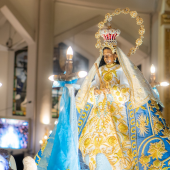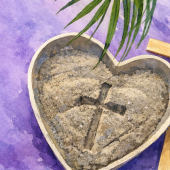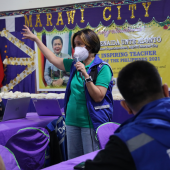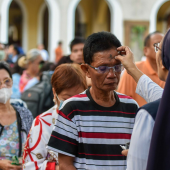Filipina catechist keeps passion for teaching catechesis alive and bouncing
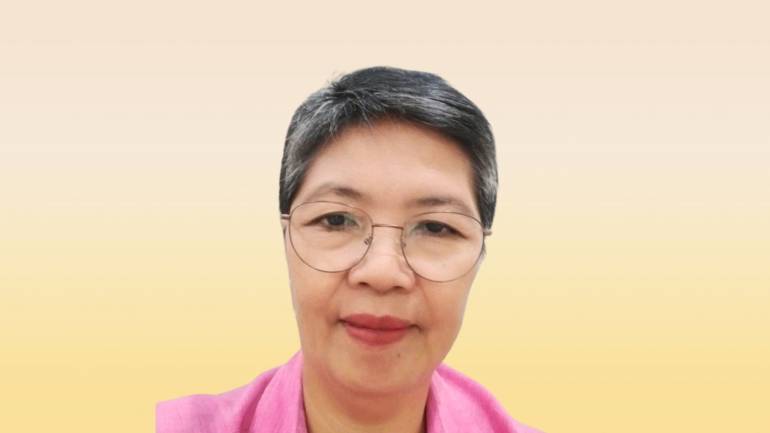
Bramie T. Tayactac, a laywoman from the Diocese of Parañaque in the Philippines, has led many non-Catholics to the faith through her years of teaching catechism. Among her converts is a forty-something former member of a Protestant church.
She also taught catechism to a Muslim man who wished to join the Roman Catholic Church. However, Bramie, 58, does not usually teach catechism to Muslims without full consent from their parents. Since the man wanted to convert in secret and had not informed his parents, she catechized him discreetly.
Teaching catechism, she explained, is not as easy as it seems. At times, half of her students are non-Catholics. Some attend her classes with the intent of testing or challenging the Catholic faith.
“There are students who engage you in debates to challenge the Catholic Church,” she said. “They come prepared with tough questions.”
Most of those who challenge her are members of born-again Christian sects, she noted. Others from different religious groups or sects attend quietly, not questioning Catholic teachings during her class.
Some non-Catholic students even cover their ears while she speaks, explaining that their religious beliefs forbid them from hearing Catholic doctrine.
“Catechism is difficult to teach,” she said. “You can easily teach mathematics, but not catechism.”
A memory that continues to touch her is of a young Muslim girl from one of her public school catechism classes. Though only in Grade 3 at the time, the girl would fold her hands and silently join in prayer with the Catholic students.
“I asked her what she was praying,” Bramie recalled. “She told me she was praying the same prayer that we Catholics say in the classroom.”
“She was so sweet,” Bramie said. “Maybe she’s in high school now.”
Based on her long years of experience, Bramie shared that converting Muslims is the most challenging aspect of her mission.
“Converting a Muslim is difficult,” she said. “And converting a female Muslim is even more difficult than converting a male Muslim.”
As a catechist, Bramie also hears heart-wrenching stories from her students. Some disclose that they suffer abuse at home, with stepfathers often among the perpetrators.
She emphasized that catechesis also helps parents to become responsible protectors and providers for their children. Abusers, she said, must be held accountable.
Despite the challenges, Bramie’s passion for catechesis remains as strong as when she first started teaching while working at a bakery chain in Metro Manila, where she was a production manager.
She trained to be a catechist for two years while still employed. She began teaching in public schools in Parañaque and Las Piñas—then still outside the Diocese of Parañaque.
After years of parish and school catechesis, she pursued a Master of Arts in Religious Studies, majoring in Scripture, at the Institute of Formation and Religious Studies in Quezon City. She received a scholarship in 2020 and graduated in 2025.
Her master’s degree is a testament to her enduring passion for helping the Church form the faithful, especially the young.
Inspiring stories like that of the young Muslim girl continue to fuel her dedication.
Now retired from full-time work, Bramie still teaches catechism. She also offers catechetical formation via Zoom to parents whose children are preparing for baptism.
When she was still employed at the bakery chain, she taught catechism on Sundays.
“When I began teaching in school, I resigned and put up my bakeshop,” she said.
She and her family operated the bakeshop for a year. Later, she began accepting baking orders from home while continuing to teach catechism for half a day.
“The role of the catechist in the Philippine context is both pastoral and missionary in nature,” she said. “In my case, I serve not only as a teacher of the faith but also as a faith companion—walking with children, youth, adults, parents, young professionals, especially those preparing for and receiving the sacraments, and my fellow catechists.”
She prays that her students will grow into exemplary Christians and well-informed citizens, especially in today’s climate where misinformation spreads quickly on social media and society is deeply divided.
She also prays they will become responsible caretakers of our common home and help safeguard, preserve, and enrich it for today’s and future generations.
Bramie and her husband are blessed with three children, who help run their home-based baking business.
Radio Veritas Asia (RVA), a media platform of the Catholic Church, aims to share Christ. RVA started in 1969 as a continental Catholic radio station to serve Asian countries in their respective local language, thus earning the tag “the Voice of Asian Christianity.” Responding to the emerging context, RVA embraced media platforms to connect with the global Asian audience via its 21 language websites and various social media platforms.










